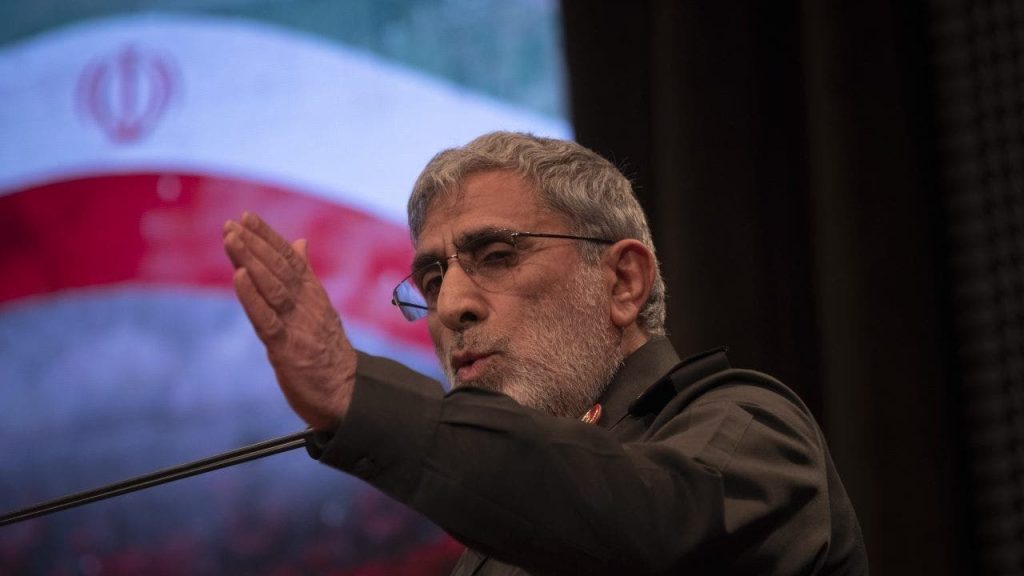The commander of Iran’s Revolutionary Guards Corps (IRGC) overseas military-intelligence service, Esmail Qaani, has not been heard from since last week’s strikes on Beirut, Iranian officials have confirmed. Qaani, who traveled to Lebanon after Hezbollah leader Hassan Nasrallah was killed in an Israeli airstrike, was reportedly in the southern suburbs of Beirut during a missile strike that targeted senior Hezbollah official Hashem Safieddine. Safieddine was a likely successor to Nasrallah, who died in the strike on Sept. 27. The Iranian and Hezbollah officials have been unable to contact Qaani since the strike on Safieddine, raising concerns about his safety and whereabouts.
The uncertainty surrounding Qaani’s whereabouts has led to speculation that he may have been injured or is in hiding, according to Behnam Ben Taleblu, a senior fellow at the Foundation for Defense of Democracies. Taleblu noted that the higher up an official is, the harder it is to conceal, and the lack of information from Iranian authorities about Qaani’s status is concerning. Israeli military spokesperson Lt. Col. Nadav Shoshani said that the results of the strikes in Beirut are still being assessed, but confirmed that the attack targeted Hezbollah’s intelligence headquarters. Qaani’s Quds Force is responsible for overseeing Tehran’s dealings with allied militias like Hezbollah across the Middle East, making his disappearance even more concerning for Iranian and Hezbollah officials.
The Israeli airstrike that targeted Safieddine and the resulting chaos in Lebanon has led to command-and-control issues among Iranian and Hezbollah officials, generating rumors about Qaani’s fate. Safieddine’s potential succession to Nasrallah’s leadership has added to the tensions in the region, as Iran and Hezbollah struggle to maintain communication with key officials in the wake of escalating hostilities with Israel. The unresolved situation with Qaani and the reported deaths of other high-ranking Iranian and Hezbollah commanders suggest a significant destabilization of the region’s power dynamics, with potentially far-reaching consequences for future military operations and political alliances.
The Israeli military’s continued operations in Lebanon against Hezbollah and other terrorist groups have raised concerns about further escalation in the region. Israeli officials have warned that “everything is on the table” as they prepare to respond to Iranian missile attacks and other threats. The ongoing conflict between Israel and Iran, as well as their respective proxies in Lebanon, has intensified in recent months, leading to fears of a wider regional conflict. The uncertainty surrounding Qaani’s fate adds another layer of complexity to the already volatile situation, with potential implications for future military strategies and diplomatic efforts.
The lack of information about Qaani’s status and the broader implications of his disappearance highlight the fragility of the current geopolitical landscape in the Middle East. The ongoing conflict between Iran, Israel, and their proxies in the region has created a complex web of alliances and enmities that could escalate into a broader conflict with devastating consequences. The reported deaths of key Iranian and Hezbollah officials, including Nasrallah and Nilforoushan, have further exacerbated tensions and raised questions about the stability of the region. The uncertainty surrounding Qaani’s whereabouts underscores the potential for further violence and instability in the region, with implications for global security and diplomacy.
Overall, the disappearance of Esmail Qaani and the broader context of escalating tensions in the Middle East point to a potentially dangerous and unpredictable situation in the region. The ongoing conflict between Iran, Israel, and their proxies, including Hezbollah in Lebanon, has the potential to spiral out of control and trigger a wider regional conflict. The reported deaths of key Iranian and Hezbollah officials, as well as the uncertainty surrounding Qaani’s fate, highlight the fragility of the current geopolitical landscape and raise concerns about the potential for further violence and destabilization. The international community will need to closely monitor developments in the region and work towards diplomatic solutions to prevent further escalation and promote peace and stability in the Middle East.


